Howdy Kids!
I drew a special comic last week for the upcoming The Story conference, the theme of which was Wilkie Collins’ famous motto, “Make ’em laugh, make ’em cry.. and make ’em wait.” I have the last part NAILED!
Without further ado! ANGST!!! DRAMA!!!!! CHARTS!!!!!!!!
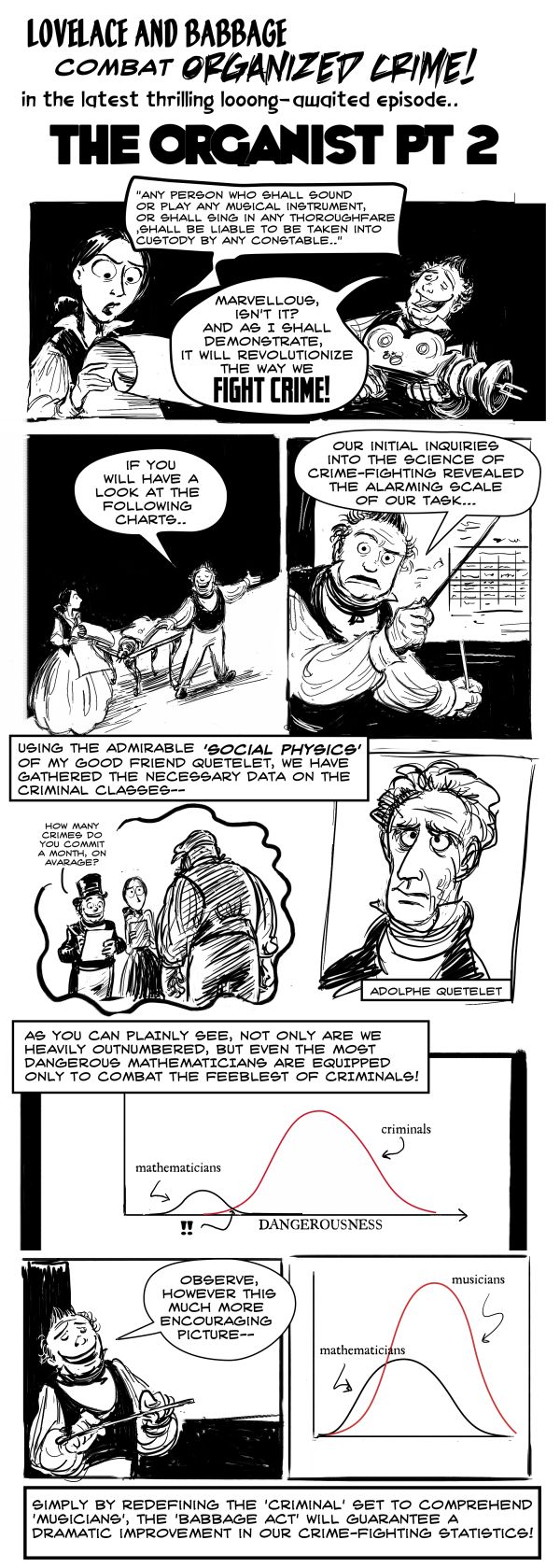
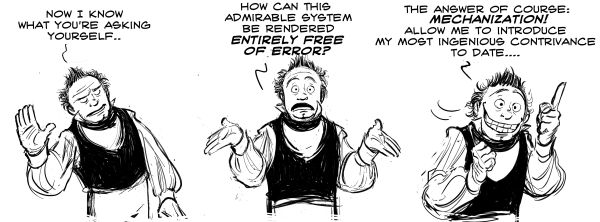
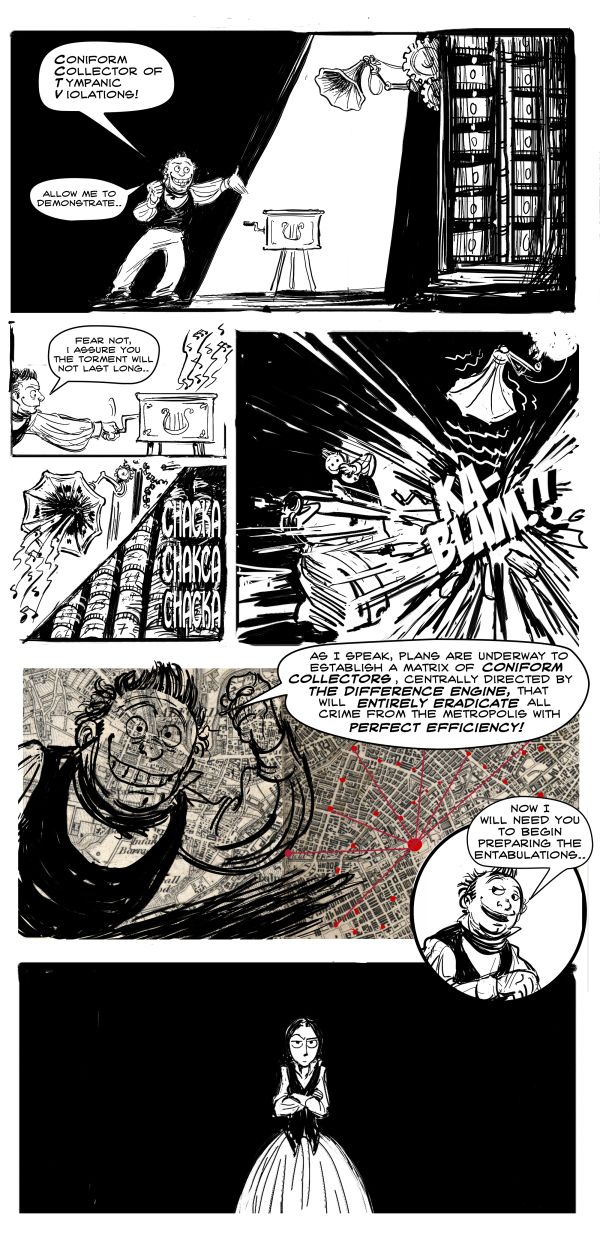
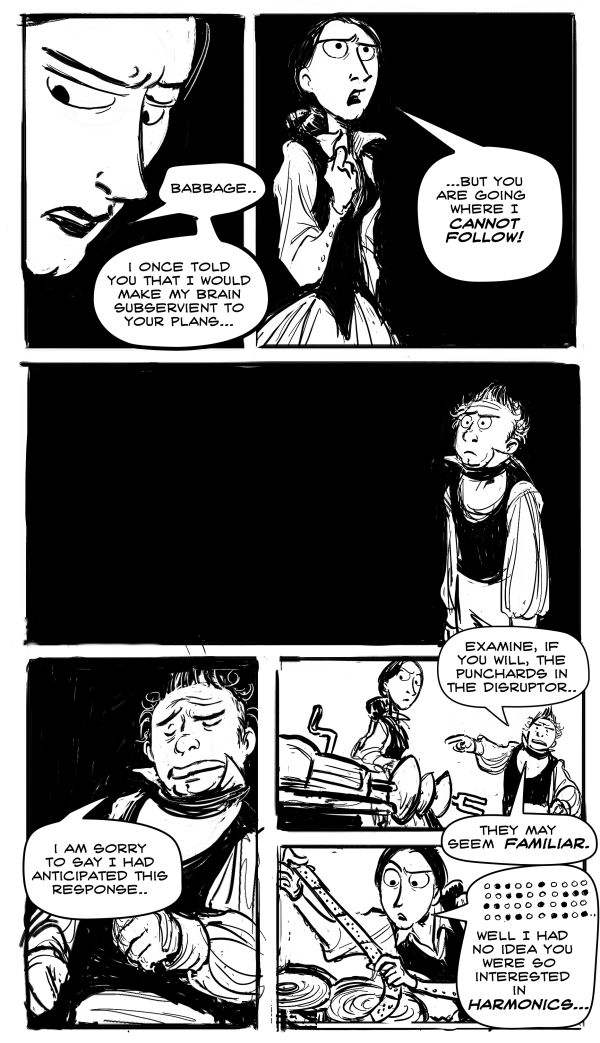
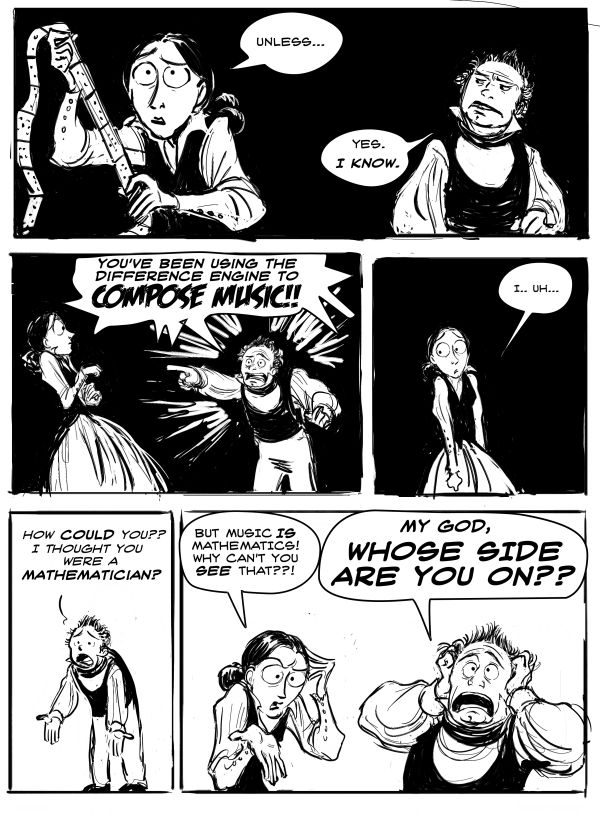
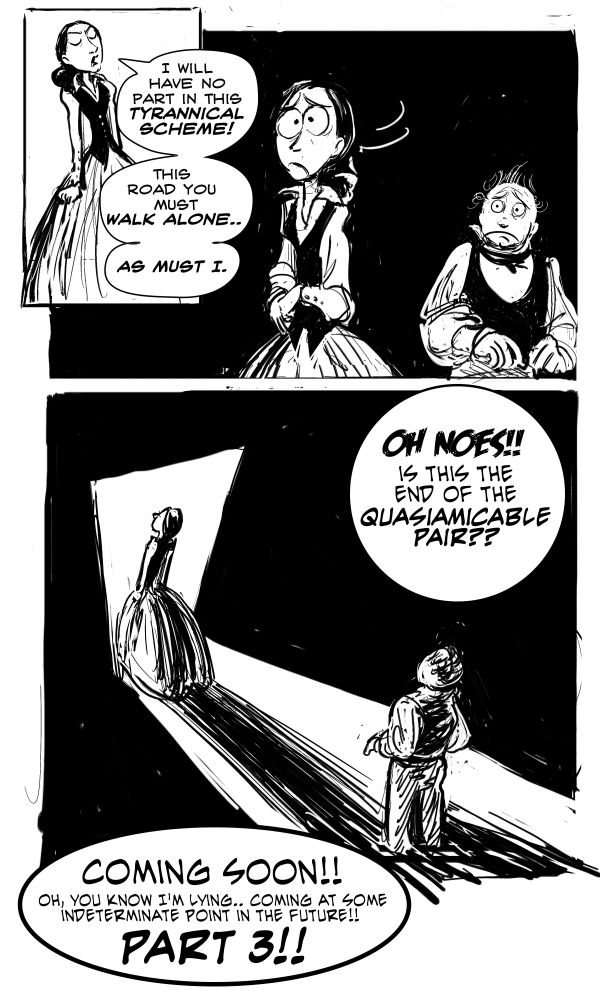
NOTES:
— Quasiamicable Pair. Man I get so many gags from Wolfram Alpha..
— I am extremely excited to introduce Adolphe Quetelet to this comic. A man after Babbage’s own heart, he began like Babbage in the field of Life Insurance, before expanding his interests to Crime-Fighting. No, really! Although Quetelet lived in Brussels two such twinned souls were bound to be aware of each other and they show up together in plenty of documents. Babbage credits Quetelet with inspiring him to form the Statistical Society, which is I suppose what Quetelet refers to when he schoolgirlishly squees over Babbage’s ‘gigantic plan’ to compile statistics on, uh, EVERYTHING. It was to Quetelet that Babbage seems to have made his first official announcement of his plans for the Analytical Engine, in 1835— although, he must have been talking about it to Lovelace earlier than that, as possibly the first written reference to punchcard computing would be from a letter she wrote when she was still Ada Byron in 1833, when looking upon the Jaquard Loom: “This Machinery reminds me of Babbage and his gem of all mechanism.”
— There was of course no ‘Babbage Act’ proper, but he figures prominently in the events leading up to the “Street Music (Metropolis) Bill”, which I’ve slightly amended to ensure the absolute banning of all street music, not even excluding Punch and Judy shows which the original bill shockingly allowed. In the public’s mind it might as well be the Babbage Act however– nearly every parliamentary debate I can find on the subject has a mention of him:
The Mr Bass arguing for the bill in that debate was the founder of the still-chugging Bass Brewery, and publisher of “Street Music in the Metropolis”.
I feel obliged to reassure everyone that, although I’ll be producing a parade of entertaining documents regarding Babbage and Street Music, there is no need to form a Tragic Picture of Charles Babbage, Unacknowledged Genius, unjustly known by his ungrateful age only as the enemy of street music. Babbage himself might have indulged himself with such a picture, but in my opinion the Victorians on the whole did themselves credit here. At least going by the popular press, the contemporary view of Babbage seems to have been, “Charles Babbage, that super-genius who invented some sort of amazing calculating machine, that has unfortunately run into technical and financial difficulties, but still! super-genius!” Even I, who have become accustomed to running across his name everywhere, was taken aback the other day to see someone refer to him as more famous than Newton!
Anyways, just in case that’s been keeping anyone up at night. Worrying about Babbage I mean.
— The lengthy section in which Lovelace discusses the potential for the Analytical Engine to manipulate symbols as well as numbers (Note A) uses the example of music as such an application:
Given that she was well aware that Babbage couldn’t stand music (he ‘tolerated it in its exquisite form’ is the best he can claim), and given that the both of them had a lamentable habit of joking around in their private correspondence, I have feeling she put that in to kind of yank his chain a little bit– especially from the use of that otherwise mysterious word ‘extent’. If a cartoonist may be allowed an opinion.
— That’s actually a map of Manchester in 1843 that Babbage is looming over; I couldn’t find a public-domain one of London. Curses!
Well I don’t know about you but I’m STARVING. Enjoy the comic!
EDITED TO ADD:
Oh geez I can’t believe I forgot a Most Important Note!!!
Ada Lovelace did indeed once tell Babbage that she would make her brain subservient to his plans– well, what she actually wrote (in 1841, at a guess, she hardly ever dated her letters) was:
“It strikes me that at some future time (it might be even within 3 or 4 years, or it might be many years hence), my head may be made by you subservient to some of your purposes & plans. If so, if ever I could be worthy or capable of being used by you, my head shall be yours. And it is on this that I wish to speak most seriously to you. You have always been a kind and real & most invaluable friend to me; & I would that I could in any way repay it, though I scarcely dare so exalt myself as to hope however humbly, that I can be intellectually worth to attempt serving you.”
It’s always helpful when people already talk like comic books, so their dialogue is much easier to write! That is quoted by the way from the most invaluable source of Babbage/Lovelace correspondence, the lengthy 1980 article Lady Lovelace and Charles Babbage. It crams loads of primary documents into 30 pages, has a minimum of the Helpful Editorializing that so wearisomely burdens this subject, is refreshingly capable of admitting to ambiguity and downright unknowability, and has the additional interest of being written by computer pioneer Harry Huskey and his wife Velma. I’ve found this more useful than all the books on the subject of Lovelace put together, to be absolutely honest for a fraction of a second. Unfortunately you have to cough up 19 bucks for it, unless you belong to a subscribing institution. The things I do for this comic!
Comments
40 responses to “Lovelace and Babbage Vs. The Organist Pt 2”
ZOMG. I so would love to see a panel of Babbage and Richard Feynman (via HG Wells’ time machine fer sure) commiserating over how much they hate music while their mathematician friends can’t seem to get enough of it.
Though Feynman ended up really really really liking drums and rhythm. Wonder if Babbage also did and we just don’t know?
[…] presents a hideous mutant offshoot « Goodies! Giant Monsters! Lovelace and Babbage Vs. The Organist Pt 2 […]
[…] and links to further history, often with interesting comments from others, such as in reference to “Lovelace and Babbage vs. the Organist, pt. 2″, which offers Adolphe Quetelet (who did what was then called “social physics”) as […]
LOVE the comic. Two of the panels from this one would make BRILLIANT wallpapers: Lovelace, annoyed, standing arms crossed in the middle of a black background; Babbage, devastated, to the right of a black background. I don’t suppose you’d be so kind as to supply larger versions for your adoring fans? :) If Zazzle lets you sell downloadable files, I’d pay!
Hi there, it’s my first time posting.
Some dangerous stuff happening, Sydney. The internal conflict begins! Between Babbage and Lovelace, and in Lovelace herself. So now where will she go, now that she’s left the Difference Engine HQ?
[…] 2D Goggles » Lovelace and Babbage Vs. The Organist Pt 2 […]
Oh, ell oh ell – I just opened up this week’s “Imperial City: London C 19th” class reading and it is totally a report presented to the Royal Statistical Society. It’s by Charles Booth – couldju just skim it for me and regurgitate the general concepts in comic form so I don’t have to digest all these tables of figures?
I see Charles Babbage is having a Basil of Bakerstreet psychotic relapse, here. I fully approve.
My favourite bits: Quailing Lovelace and oblivious Babbage in panel 4; and the mathematicians v. musicians graph.
“If so, if ever I could be worthy or capable of being used by you, my head shall be yours.”
Wow. That’s… that’s some pretty sexy stuff.
And, yes, I too now find her habit of underlining words to be extremely irritating.
Thanks for the heads up on the article! I’d like to get access to it while I can (if I can).
The Royal Mail is celebrating the 350th anniversary of the Royal Society. Check this stamp out:
http://www.newscientist.com/gallery/the-royal-society-stamp/4
Oh, Babbage. That’s right, you lived before von Neumann and Ted IKaczynski.
And Moriarty. Can’t forget Moriarty.
Great Scott! That’s exciting! There’s a fun tale as to how I discovered this site…: while I was trying to find pictures of steampunk fashion (in the early morning), I came across the picture of Babbage and Lovelace discussing what steampunk means. So throughout the day I had wondered where I heard the name ‘Lovelace’ before, finally at the end of the day at school I had my teacher look it up for me, he said “Ada Lovelace, the first computer programmer, she helped Charles Babbage’s invention perform algorithms.” When I went home I Googled “lovelace and babbage” and the suggestion box showed “lovelace and babbage comic” I click on it and ta-da! I found your grand site! Now I tell everyone about it and how funny it is, although I’m not sure if I understand all of it. I also like it for its difference compared to other comics, despite that I’ve never became a fan of a comic, until now. So, like many others I anxiously await what will happen to the grand pair that is Lovelace and Babbage!
“Music Is What Numbers Feel Like” — I read this on a sci fi blog and my first thought was “oh god, don’t tell Babbage.”
http://io9.com/5474251/music-is-what-numbers-feel-like/gallery/
Ever since your footman gag I’ve had this nagging sensation that I’d read something you could use on footmen… finally:
Mark Girouard tells us that in the 16th/17th century footmen would “run messages, especially in London. A fast-running footman with plenty of staying power was much prized, and from at least the mid seventeenth century owners were racing their footmen against each other, and betting heavily on the result.” Life in the English Country House, p 141.
punchards?
Redefining music as crime because its easier to fight than crime and because statistics would show that you were succesful in fighting ‘crime’? Kuhnian paradigm? How post-modern of Master Babbage! :-)
Ha ha ha! That comic brought JOY.
Also i laughed really loud at the most dangerous mathematicians line and EVERYONE in the office looked at me.
I’m going out on a tangent here and say that I REALLY love the use of negative space in this page! …. That is all, unless I repeat myself!
Now, now, Mr. Babbage, Mr. J. S. Bach is proof your division of mathematics and music is untenable.
How do I love these episodes? Let me count the ways!
Simply grand! I must assume that your steam-powered drawing implement takes a very long time to recharge between episodes. If the mechanism can be improved, allowing for more frequent updates, I would celebrate! Ardently!
Cor!
What we’re now missing is a t-shirt with The Babbage Act.
Yikes! Better keep that machine directed away from songbirds and chickens! “It’s not pretty, when they blow!”
Brilliant, as usual! Keep up the great work!
Oh noes indeed! Come back Ada!
And in case code doesn’t work in the comments section (it probably won’t!) Here’s a link:
http://inudge.net/inudge#/2bjs
Here is what Ada’s punch-card song could sound like:
B-but music, mathematical or otherwise, plus…let’s call it “X,” equals songs…This indulgence won’t end well.
Lastly, you make schoolgirlishly squeeing sound like a bad thing. I’m only mildly ashamed to say that’s a pretty good description of what I do when I see an update here.
I am, however, more ashamed to say that I initially read the danger graph as the level of danger per person, and wondered why the criminals were off to the right. And I only work with a real live (relatively speaking) statistician. On the other hand, it had the advantage of my being about to muse on mathematicians being “on the leading edge of the danger curve,” which has a great ring to it.
Oh, right. At some point, I will need to look at the store. New job. New money…
(That was “for liberal interpretations of ‘lastly,’” obviously.)
The perfect blend of historiography, maths and melodrama. Love it!
A cliff-hanger! *squee!*
This has quickly become my favorite web comic, lying as it does at the intersection of history, mathematics and illustration, with a wandering cosmic string of hyperenthusiasm threaded through and jolting the whole business. Please keep it up, however long it takes between updates! We don’t care! More L&B! Huzzah!
HAPPY ADA LOVELACE DAY!
Great, as usual!
It’s less “sketchy” than other issues: the art is really neatier. Next time, color? =p
Also, yay! A belgian in the comic! ^_^
Hello Sidney;
I’ve been waiting patiently, as only a steam engineer can, for this next installment of your gloriously written and illustrated comic to entertain and enlighten me.
Never fearing that you would disapoint me and you haven’t indeed you have exceeded my expectations ! HURRAH !
Thanks so much for your glorious endeavour !;
Arthur
You are one step from perfection. More frequent updates! Have you thought about thinking less? You’ll still be leagues ahead on wit(Ps. SS Great Britain with it’s cigar smoking engineer at the wheel? Awesome Tee-shirt idea!)
Bliss! We are once again gifted with your art, wit and attention! (laughs and dances ’round the desk) As my daughter observed, “This Sydney-grl is awesome – she’s just totally been dipped in ‘awesome sauce’! So cool!”
Thank you, thank you, very very much
I hope you never tire of these two. I adore them.
Bruce- thanks!
Paul- OMG my comic is PSYCHIC. No I had no idea!
Gilbert– I think your Italian mathematician is almost certainly Menabrea, whose Notes on Babbage’s engine were translated by Lovelace. The observation about music is the one quoted above, from Lovelace’s ‘footnotes’- the footnotes are three times longer than the Menabrea paper, and contain the most interesting stuff, including the early programs. You can read the whole thing in the link above! I’m going to take a wild guess that your book on Babbage was Bruce Collier’s?
Prescott– I await your steam bicycle with eagerness, and from a safe distance!
Del– Fear not, I’ve been saving Nightingale up for Vampire Poets!
How could you introduce Quetelet without mentioning his corresponding companion, the Lovelace to his Babbage, Florence Nightingale?
I know, everybody thinks of her as a sort of nurse, but she was actually the first woman to be elected a Fellow of the Statistical Society. She was the Al Gore of her day, traveling around the country lecturing on the statistics of army attrition. Her Uncomfortable Truth was that most soldiers died, not in glorious battle, but of diarrhoea, and that a proper attention to health care in the field would result in a bigger, fitter fighting force.
She kept the big books of dry statistics for her fellow stats geeks, and instead used fancy graphs (her famous sector area diagram of deaths in the Crimean War was Quetelet’s invention). She put the colorful pie charts and bar charts into small pamphlets she called ‘coxcombs’; “I’m going to give a talk in Manchester,” she’d write to her printers, “so I need another two hundred coxcombs to distribute.”
Calculation! Cow catchers! Cacophonies of infernal calliopes! Bravo on the most dangerous and brilliant of comic experiments, my dear! I just stumbled onto this site while researching the possibilities of a steam powered electric assisted wooden bicycle, (of all things). I’m hooked, I must say.
Right. I off to your emporium to purchase a trifle or two. You are entitled to some small stipend for your illustrative labors, at least! Outstanding job what?
Cheers!
Some years ago, I read a book about Babbage; in which there was an excerpt from a piece an Italian mathematician (whose name escapes me) wrote wherein he suggested that the Babbage Engine could, indeed, be hooked up (somehow) to musical instruments and instructed to play them.
Also, yay for new comic! You really are very good, you know…
In what I can only assume is a staggering coincidence (although, knowing the amount of research you do, maybe not) you appear to have placed the Difference Engine, in the map of Manchester, almost on top of the Alan Turing Memorial!
http://en.wikipedia.org/wiki/Alan_Turing_Memorial
Love, love, LOVE, the maniacal grin superimposed over the map, even though it *is* a map of Manchester…